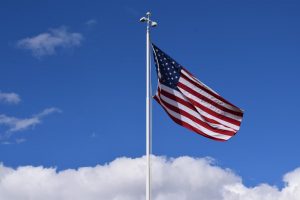The Pledge is not unconstitutional
January 20, 2021
Some students in the United States refuse to stand for and recite the Pledge of Allegiance. One example of such a person is a sixth-grader from Florida who told a substitute teacher that he would not stand because he felt the flag symbolized “discrimination of Blacks”, according to CNN. In other words, he felt like the flag represented racial discrimination. But why?
To me, the Pledge explains that this country cannot be split into parts and that every person in this country deserves freedom and fairness (“indivisible”, “liberty and justice for all”).
Back in 1943, there was a court case in West Virginia (West Virginia State Board of Education v. Barnette) where the judge found that it is legal to not recite the Pledge but that a person should, at the very least, quietly and respectfully wait until it is complete. Other people have the right to recite the Pledge if they want to, and they deserve to do so in a place that protects that right. The case was taken to the United States Supreme Court in order to discuss the First Amendment rights that protects students’ choice to stand for the flag or not and draws special attention to the importance of respect in one’s choices.
While I have not personally seen students refuse to stand or act in a disrespectful manner, I have been told that not everyone stands at Mead High School and many other high schools. In fact, some schools have gotten rid of the Pledge only to have students fight to bring it back.
The Pledge throws people off due to the word “God”. In many cases, the word “God” also refers to our main rights: life, liberty, and the pursuit of happiness.
Why would we want to take away the mention of our God-given rights — the natural rights our government intends to uphold — the most basic and necessary rights a person should have?
The Pledge of Allegiance does not prevent anyone from exercising their rights. It refers to our rights, our government, and the unity of America.
Every day when a student stands for the Pledge at school, they are reminded of what the country should stand for. Some people, like me, believe that we are a nation under God, and others recite this saying a nation under our rights — our God-given rights. Either way, it reminds us of our values and beliefs when we stand. After students have been raised reciting these ideals, they can then choose to look at the meanings behind the Pledge of Allegiance, understand why this country is worth fighting for, and recognize our founding beliefs.
Furthermore, one’s allegiance to the flag does not equal allegiance to any particular president or government official: when offices change, the Pledge remains the same. The Pledge is not a political symbol.
The Pledge of Allegiance does not violate our rights. In fact, it touches on the American ideal of unity and the rights that founding fathers and citizens have held so near to their hearts. Standing for the Pledge of Allegiance is a right that we should not take for granted.



Aspen Bingham • Mar 18, 2022 at 9:33 am
i really like this skylar!! i definitely agree that the pledge represents our “rights, our government, and the unity of America.”
Arizona Lee • Mar 3, 2021 at 10:48 am
Good job Skylar! This is a wonderfully written piece and brings up some great, well argued points. The correlation between “God-given rights” and “natural rights” is very interesting, I’m glad you touched on that. :))